英语话题-生物多样性Biodiversity
生物多样性介绍英语作文
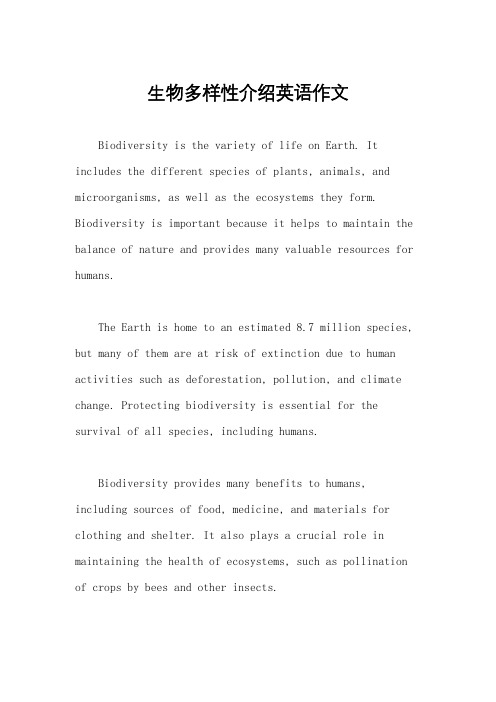
生物多样性介绍英语作文Biodiversity is the variety of life on Earth. It includes the different species of plants, animals, and microorganisms, as well as the ecosystems they form. Biodiversity is important because it helps to maintain the balance of nature and provides many valuable resources for humans.The Earth is home to an estimated 8.7 million species, but many of them are at risk of extinction due to human activities such as deforestation, pollution, and climate change. Protecting biodiversity is essential for the survival of all species, including humans.Biodiversity provides many benefits to humans, including sources of food, medicine, and materials for clothing and shelter. It also plays a crucial role in maintaining the health of ecosystems, such as pollination of crops by bees and other insects.Conserving biodiversity is a global challenge that requires cooperation between governments, organizations, and individuals. Efforts to protect biodiversity include creating protected areas, implementing sustainable land use practices, and raising awareness about the importance of biodiversity.It is important for everyone to take action to protect biodiversity, whether it's by supporting conservation efforts, reducing their ecological footprint, or advocating for policies that promote sustainability. Each individual has a role to play in preserving the rich variety of life on Earth.。
生物多样性有关英语作文
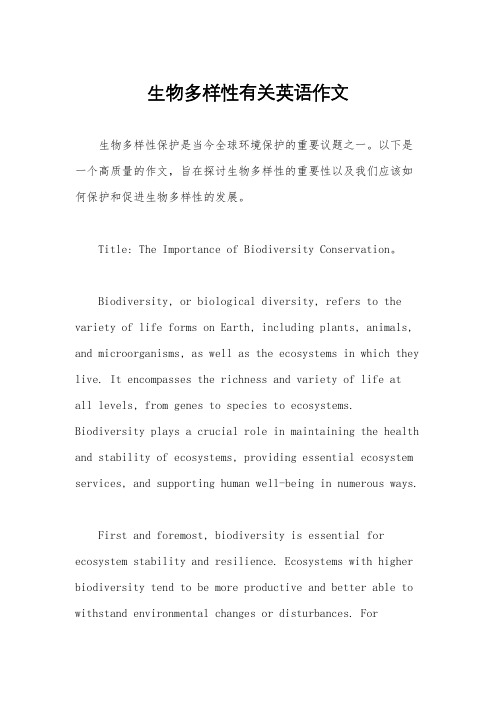
生物多样性有关英语作文生物多样性保护是当今全球环境保护的重要议题之一。
以下是一个高质量的作文,旨在探讨生物多样性的重要性以及我们应该如何保护和促进生物多样性的发展。
Title: The Importance of Biodiversity Conservation。
Biodiversity, or biological diversity, refers to the variety of life forms on Earth, including plants, animals, and microorganisms, as well as the ecosystems in which they live. It encompasses the richness and variety of life atall levels, from genes to species to ecosystems. Biodiversity plays a crucial role in maintaining the health and stability of ecosystems, providing essential ecosystem services, and supporting human well-being in numerous ways.First and foremost, biodiversity is essential for ecosystem stability and resilience. Ecosystems with higher biodiversity tend to be more productive and better able to withstand environmental changes or disturbances. Forexample, a diverse forest ecosystem can better resist pests and diseases, recover more quickly from natural disasters like wildfires or storms, and maintain essential functions such as nutrient cycling and water purification. Thus, biodiversity is often referred to as nature's insurance policy against environmental uncertainties.Furthermore, biodiversity is critical for providing ecosystem services that support human livelihoods and well-being. These services include provisioning services such as food, medicine, and raw materials; regulating services such as climate regulation, pollination, and pest control; cultural services such as recreation, tourism, andspiritual enrichment; and supporting services such as soil formation, nutrient cycling, and oxygen production. Many of these services are directly or indirectly essential for human survival and economic development.In addition to its ecological and economic importance, biodiversity also has intrinsic value and contributes to the aesthetic, cultural, and spiritual aspects of human life. People derive pleasure and inspiration from thebeauty and diversity of nature, whether it's watching colorful birds, exploring diverse ecosystems, or admiring the intricate patterns of plants and animals. Biodiversity also plays a significant role in cultural traditions, spiritual beliefs, and indigenous knowledge systems around the world, enriching human culture and identity.Despite its importance, biodiversity is facing unprecedented threats due to human activities. Habitat destruction, fragmentation, and degradation are leading causes of biodiversity loss, driven primarily by factors such as deforestation, urbanization, agricultural expansion, and infrastructure development. Pollution, overexploitation of natural resources, invasive species, and climate change are exacerbating these threats, further compromising the integrity and resilience of ecosystems worldwide.To address the crisis of biodiversity loss, concerted efforts are needed at local, national, and global levels. Conservation strategies should focus on protecting and restoring habitats, establishing protected areas, promoting sustainable land-use practices, combating illegal wildlifetrade, controlling invasive species, reducing pollution, and mitigating climate change. Furthermore, efforts to conserve biodiversity should involve collaboration among governments, local communities, indigenous peoples, non-governmental organizations, scientists, businesses, and other stakeholders.Education and awareness-raising are also essential for fostering a culture of biodiversity conservation and sustainable development. People need to understand the value of biodiversity, the threats it faces, and the actions they can take to protect it. Public participation, citizen science, environmental education, and capacity-building initiatives can empower individuals and communities to become stewards of biodiversity and advocates for change.In conclusion, biodiversity conservation is a matter of paramount importance for the health of the planet and the well-being of current and future generations. By safeguarding biodiversity, we can ensure the resilience and sustainability of ecosystems, support human livelihoods andprosperity, and preserve the beauty and wonder of naturefor all to enjoy. Let us join hands in protecting and promoting biodiversity for the benefit of all life on Earth.。
biodiversity的英语作文
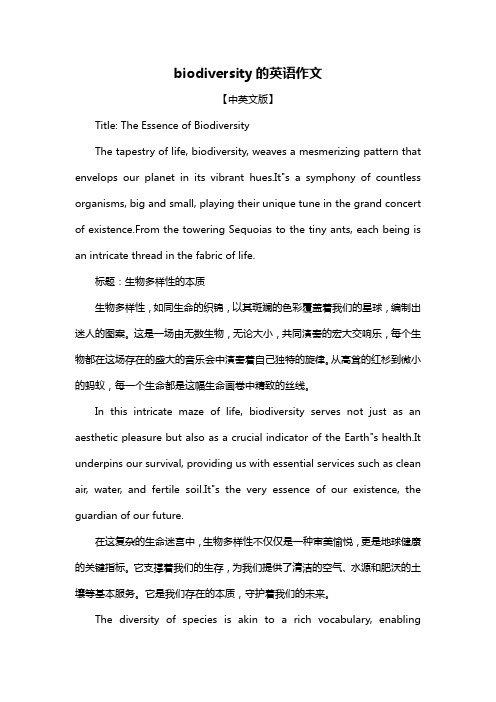
biodiversity的英语作文【中英文版】Title: The Essence of BiodiversityThe tapestry of life, biodiversity, weaves a mesmerizing pattern that envelops our planet in its vibrant hues.It"s a symphony of countless organisms, big and small, playing their unique tune in the grand concert of existence.From the towering Sequoias to the tiny ants, each being is an intricate thread in the fabric of life.标题:生物多样性的本质生物多样性,如同生命的织锦,以其斑斓的色彩覆盖着我们的星球,编制出迷人的图案。
这是一场由无数生物,无论大小,共同演奏的宏大交响乐,每个生物都在这场存在的盛大的音乐会中演奏着自己独特的旋律。
从高耸的红杉到微小的蚂蚁,每一个生命都是这幅生命画卷中精致的丝线。
In this intricate maze of life, biodiversity serves not just as an aesthetic pleasure but also as a crucial indicator of the Earth"s health.It underpins our survival, providing us with essential services such as clean air, water, and fertile soil.It"s the very essence of our existence, the guardian of our future.在这复杂的生命迷宫中,生物多样性不仅仅是一种审美愉悦,更是地球健康的关键指标。
关于生物多样性的重要性英语作文
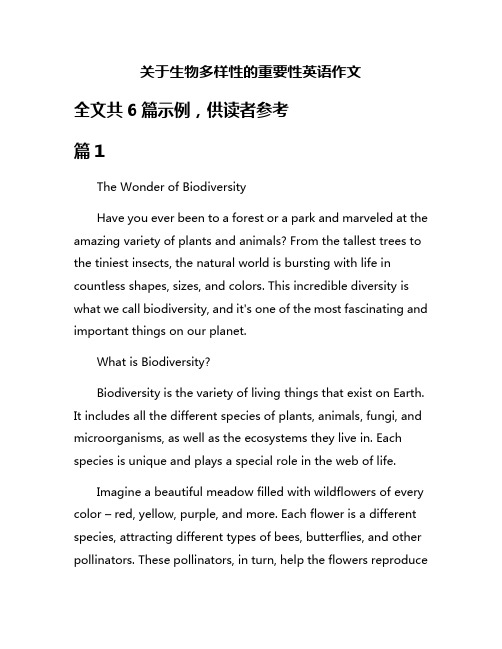
关于生物多样性的重要性英语作文全文共6篇示例,供读者参考篇1The Wonder of BiodiversityHave you ever been to a forest or a park and marveled at the amazing variety of plants and animals? From the tallest trees to the tiniest insects, the natural world is bursting with life in countless shapes, sizes, and colors. This incredible diversity is what we call biodiversity, and it's one of the most fascinating and important things on our planet.What is Biodiversity?Biodiversity is the variety of living things that exist on Earth. It includes all the different species of plants, animals, fungi, and microorganisms, as well as the ecosystems they live in. Each species is unique and plays a special role in the web of life.Imagine a beautiful meadow filled with wildflowers of every color – red, yellow, purple, and more. Each flower is a different species, attracting different types of bees, butterflies, and other pollinators. These pollinators, in turn, help the flowers reproduceand spread their seeds. Without this diversity of plants and insects working together, the meadow would soon become a bare, lifeless field.The Wonders of BiodiversityBiodiversity is truly amazing when you stop to think about it. There are millions of different species on our planet, from the mighty blue whale, the largest animal on Earth, to the tiny water bear, a microscopic creature that can survive in the harshest environments, including outer space!Every species has unique adaptations that help it survive in its environment. Some animals, like the polar bear, have thick fur to keep them warm in freezing temperatures. Others, like the camel, can go for long periods without water, thanks to their special ability to store fat in their humps.Plants, too, have incredible adaptations. The Venus flytrap, for example, can trap and digest insects using its leaf-like jaws. The desert cactus can store water in its thick stems, allowing it to survive in the driest of places.Biodiversity is not just about individual species, though. It's also about the complex relationships between living things and their environments. Each species plays a role in its ecosystem,and when one species disappears, it can have far-reaching consequences.The Importance of BiodiversityBiodiversity is essential for the health of our planet and our own well-being. Here are some reasons why it's so important:Ecosystem Services: Biodiversity provides us with many valuable services that we often take for granted. For example, plants produce the oxygen we breathe, and bees and other pollinators are responsible for much of the food we eat. Without biodiversity, these essential services would be disrupted, making it difficult for humans and other species to survive.Food Security: A variety of crops and livestock breeds is crucial for ensuring a stable and nutritious food supply. If we rely on only a few types of crops, a single disease or pest could wipe out entire harvests, leading to food shortages and famine.Medical Discoveries: Many of our medicines come from natural sources, such as plants, fungi, and microorganisms. By protecting biodiversity, we increase the chances of discovering new cures and treatments for diseases.Environmental Balance: Biodiversity helps maintain the delicate balance of nature. Each species plays a role in itsecosystem, and when one species disappears, it can have ripple effects on many other species. For example, the loss of a key predator can lead to an overpopulation of its prey, which can then damage the habitat and affect other species.Economic Benefits: Biodiversity has significant economic value. Many industries, such as agriculture, forestry, and tourism, depend on the resources and services provided by healthy ecosystems.Cultural and Recreational Value: Biodiversity enriches our lives in countless ways. Many cultures have deep connections to certain plant and animal species, and people around the world enjoy activities like birdwatching, hiking, and exploring nature's wonders.Threats to BiodiversityUnfortunately, biodiversity is facing many threats around the world. Human activities, such as deforestation, pollution, climate change, and the introduction of invasive species, are putting countless species at risk of extinction.According to scientists, we are currently experiencing a mass extinction event, with species disappearing at an alarming rate.It's estimated that thousands of species go extinct every year, and many more are endangered or vulnerable.Protecting BiodiversityProtecting biodiversity is one of the most important challenges we face as stewards of our planet. Here are some ways we can help:Conserve Habitats: Protecting natural areas like forests, wetlands, and coral reefs is crucial for preserving biodiversity. These habitats provide homes for countless species and allow ecosystems to function properly.Reduce Pollution and Waste: Pollution and waste can have devastating effects on biodiversity. We can reduce our impact by properly disposing of trash, using fewer single-use plastics, and supporting clean energy initiatives.Make Sustainable Choices: When we shop for food, clothing, and other products, we can choose options that are environmentally friendly and don't contribute to habitat destruction or the exploitation of endangered species.Support Conservation Efforts: Many organizations around the world are working tirelessly to protect biodiversity. We cansupport their efforts through donations, volunteering, or raising awareness about the importance of biodiversity.Learn and Appreciate Nature: The more we understand and appreciate the natural world, the more likely we are to protect it. Take the time to explore parks, gardens, and other natural areas, and share your love of nature with family and friends.Biodiversity is a true wonder of our planet, and it's up to all of us to protect it. By working together and making conscious choices, we can ensure that the incredible variety of life on Earth continues to thrive for generations to come.篇2The Importance of BiodiversityHello everyone! Today, I am going to tell you about something very important - biodiversity! Biodiversity means the variety of living things on Earth. It includes plants, animals, and even tiny organisms like bacteria. Biodiversity is super important for our planet, and I'll explain why.Firstly, biodiversity helps to keep our environment healthy. You know, different plants and animals have different roles to play. They form a complex web of life, just like a big puzzle. If welose some pieces of the puzzle, the whole picture won't be complete. Similarly, if we lose certain plants or animals, it can disrupt the balance of nature. For example, bees help to pollinate flowers, which allows plants to reproduce. Without bees, many plants would disappear, and other animals that rely on those plants would suffer too.Secondly, biodiversity can provide us with many useful things. Think about all the things we get from nature, like fruits, vegetables, and medicines. They all come from different plants and animals. If we don't have enough biodiversity, we might lose these resources. Imagine a world without apples or strawberries! It would be so sad, right? We need to protect biodiversity so that we can continue to enjoy these things and discover new ones in the future.Thirdly, biodiversity is just so beautiful! Have you ever seen a vibrant coral reef or a lush rainforest? They are full of different colors, shapes, and sounds. Each plant and animal is unique and special in its own way. It's like a big, amazing tapestry of life. We should appreciate and protect this beauty for ourselves and for future generations.Now you might be wondering, "What can we do to protect biodiversity?" Well, there are many things we can do. We canstart by learning more about different species and their habitats. We can also plant trees and flowers to create habitats for animals. It's important to use resources wisely and not waste things. We can also support organizations that work to protect nature and raise awareness about biodiversity.Remember, we are all part of this big puzzle called biodiversity. Each one of us can make a difference, no matter how small. Let's do our part to protect and celebrate the amazing variety of life on Earth!In conclusion, biodiversity is really important for the health of our planet. It keeps our environment balanced, provides us with valuable resources, and brings beauty to our world. So let's work together to protect and preserve biodiversity for ourselves and future generations. Thank you for listening!篇3The Wonders of BiodiversityHave you ever been to a forest or a park and noticed how many different kinds of plants and animals live there? The amazing variety of living things on our planet is called biodiversity, and it's one of the most incredible things about nature.Biodiversity means the richness of different species of plants, animals, fungi, and microorganisms that inhabit our planet. From the tallest trees to the tiniest insects, from the biggest whales to the smallest bacteria, biodiversity encompasses all the fascinating creatures that share the Earth with us.Why is biodiversity so important? Well, let me tell you!First of all, biodiversity is crucial for maintaining the delicate balance of nature. All living things are interconnected and depend on each other in complex ways. Plants need animals to pollinate their flowers and spread their seeds. Animals need plants for food and shelter. Fungi and microorganisms help decompose dead matter, which provides nutrients for plants to grow. This intricate web of life is what keeps our ecosystems healthy and functioning properly.Imagine a forest with only one type of tree and one type of bird. It would be so boring and lifeless! But a forest with a rich diversity of plants, animals, insects, and fungi is a vibrant and thriving place, full of wonderful surprises at every turn.Biodiversity also plays a vital role in providing us with many of the resources we need to survive and thrive. From the food we eat to the medicines we take, many of these essentials come directly or indirectly from nature's incredible diversity.For example, did you know that nearly a quarter of all the medicines we use come from plants and microorganisms? Scientists are constantly discovering new potential cures and treatments in the rich tapestry of biodiversity. Who knows what amazing medicinal properties might be hiding in a rare plant or a peculiar fungus deep in the rainforest?Biodiversity is also crucial for maintaining clean air, fresh water, and fertile soil. Different species of plants and trees help purify the air we breathe, filter the water we drink, and enrich the soil that grows our crops. Without this natural balance, our environment would quickly become polluted and unsuitable for life.But perhaps the most wonderful thing about biodiversity is the sheer beauty and wonder it brings to our world. Can you imagine how dull and lifeless our planet would be without the vibrant colors of tropical birds, the majestic sight of a herd of elephants, or the delicate dance of butterflies in a meadow?Biodiversity is nature's way of painting a masterpiece, with each species playing a unique and irreplaceable role in the grand canvas of life. It's a constant source of inspiration, joy, and awe for artists, writers, photographers, and anyone who appreciates the beauty of our natural world.Unfortunately, human activities like deforestation, pollution, and climate change are putting immense pressure on biodiversity around the globe. Many species are becoming endangered or even going extinct at an alarming rate. Losing even a single species can have far-reaching consequences for entire ecosystems and the web of life they support.That's why it's so important for all of us to do our part in protecting and preserving biodiversity. We can start by learning more about the amazing variety of life on our planet and sharing that knowledge with others. We can support organizations that work to conserve habitats and protect endangered species. We can make eco篇4The Wonders of BiodiversityHave you ever been to a forest or a park? Did you notice all the different kinds of plants, trees, birds, and insects? That's what we call biodiversity – the amazing variety of living things found on our planet. Biodiversity is like a big, colorful puzzle with countless pieces that fit together perfectly.Imagine a world without biodiversity. It would be so boring! Just think of a forest with only one kind of tree, or a garden withonly one type of flower. How dull would that be? Biodiversity is what makes our world so vibrant, exciting, and full of surprises.But biodiversity isn't just about looking pretty. It's actually super important for the health of our planet and for all living things, including us humans. Let me explain why.First of all, biodiversity helps to keep our ecosystems balanced and functioning properly. An ecosystem is like a big community of living things that all depend on each other. For example, in a forest, the trees provide shelter and food for animals like birds, squirrels, and insects. At the same time, these animals help to spread the seeds of the trees, so new trees can grow. It's like a big circle of life!If we lose too many species from an ecosystem, it can cause the whole system to collapse, kind of like when you remove too many pieces from a puzzle, and it all falls apart. That's why it's so important to protect biodiversity and make sure we have a variety of plants and animals in every ecosystem.Biodiversity also provides us with many valuable resources that we depend on for our survival. For instance, many of the foods we eat come from different plants and animals. Can you imagine life without fruits, vegetables, grains, and meat? Yuck!Biodiversity also gives us important medicines, fibers for clothing, and materials for building our homes.But that's not all! Biodiversity even helps to regulate the Earth's climate and keep the air and water clean. Trees and other plants absorb carbon dioxide from the air and release oxygen, which we need to breathe. They also help to filter and purify the water we drink. Without a diverse range of plants and living things, our planet would be a much less healthy and pleasant place to live.Unfortunately, human activities like pollution, deforestation, and overhunting are causing many species to become endangered or even extinct. When a species goes extinct, it's gone forever, and that's really sad. It's like losing a piece of the puzzle that can never be replaced.That's why it's so important for all of us to do our part to protect biodiversity. We can start by learning about the different plants and animals in our local area and finding ways to help them thrive. Maybe you could plant a garden with a variety of flowers to attract bees and butterflies, or put up a birdhouse in your backyard.We can also reduce our waste, recycle, and be mindful of our impact on the environment. Every little bit helps to preserve the amazing diversity of life on our planet.Biodiversity is truly a wonder to be celebrated and protected. It's like a magnificent tapestry woven with countless threads of different colors and textures. Each species, no matter how big or small, plays an important role in the intricate web of life that sustains us all.So the next time you're out in nature, take a moment to appreciate the incredible variety of living things around you. From the tiny insects crawling on the ground to the majestic trees reaching for the sky, each one is a unique and precious part of the rich tapestry of biodiversity that makes our world a truly amazing place.篇5The Wonderful World of BiodiversityHave you ever gone for a walk in the park or a hike in the woods and marveled at the many different kinds of plants and animals you saw? From the towering trees to the tiny bugs crawling on the ground, the diversity of life on our planet is trulyamazing! This incredible variety of living things is what we call biodiversity.Biodiversity is the term used to describe the vast array of plants, animals, fungi, and microorganisms that exist on Earth. It encompasses not just the different species, but also the genetic diversity within each species, and the variety of ecosystems and habitats in which these organisms live.Why is biodiversity so important? Well, let me tell you!First of all, biodiversity is essential for the health of our planet. You see, all living things are connected in a complex web of life, and each species plays a crucial role in maintaining the balance of nature. For example, bees and other pollinators help plants reproduce by carrying pollen from one flower to another. In return, plants provide food and shelter for many animals, including us humans!Imagine if all the bees disappeared – it would be really hard for plants to grow fruits and vegetables, and we wouldn't have as much food to eat. Or what if all the trees in a forest were cut down? Many animals would lose their homes, and the soil could erode, making it difficult for new plants to grow.Biodiversity also provides us with many valuable resources that we use every day. From the food we eat to the clothes we wear, to the medicines that keep us healthy, we rely on the incredible variety of plants and animals on our planet. For instance, did you know that many of our medicines come from plants found in the rainforests?But biodiversity doesn't just benefit us humans – it's also crucial for the survival of countless other species. Each living thing on Earth has a unique role to play in its ecosystem, and when one species disappears, it can have a ripple effect on many others.Unfortunately, human activities like pollution, deforestation, and overhunting are causing many species to become endangered or even go extinct. When we lose a species, we not only lose a piece of the puzzle that makes up our planet's biodiversity, but we also lose potential sources of food, medicine, and other valuable resources.Protecting biodiversity is important for the future of our planet and all its inhabitants, including us. By preserving natural habitats, reducing pollution, and using resources sustainably, we can help ensure that the incredible variety of life on Earth continues to thrive.Imagine a world without the colorful butterflies flitting from flower to flower, or the majestic whales swimming in the vast oceans. Imagine a world without the delicious fruits and vegetables we enjoy, or the medicines that help us when we're sick. That's a world without biodiversity, and it's not a world any of us would want to live in.So, the next time you go outside and see a squirrel scampering up a tree or a bird soaring overhead, remember that they are part of the amazing biodiversity that makes our planet so special. And remember that it's up to all of us to protect and preserve this incredible variety of life for generations to come.篇6The Wonderful World of BiodiversityDid you know there are millions of different plants and animals on our planet? It's really amazing how many kinds of living things exist! This variety of life is called biodiversity and it's really important for keeping our world healthy and balanced.What is biodiversity? Well, it refers to all the different species of plants, animals, fungi, and microbes that live on Earth. It includes everything from the tiny microorganisms you can't even see without a microscope, to the largest creatures like bluewhales and giant sequoia trees. Every species is unique and special in its own way.Let me give you some mind-blowing examples of biodiversity. In the rainforests, there are over 3000 different kinds of frogs! Can you imagine? That's just frogs—there are also thousands of other mammals, birds, reptiles, and insects living there too. And in the oceans, it's estimated there are over 1 million species, with new ones being discovered all the time. From coral reefs teeming with colorful fish to deep sea vents where strange tubeworm creatures live near underwater volcanoes, the oceans are just bursting with life. Even in your own backyard, you'll find a remarkable diversity of insects, plants, and microbes. It's an amazing, living kaleidoscope!So why is biodiversity so important? Well, first of all, every single species plays an important role in the environment and ecosystem where it lives. All the living things are connected in complex food webs where beings eat and are eaten by others. If you remove one species from the web, it can affect many others, kind of like removing one brick from a tower. The whole system could get out of balance.For example, if a species of frog went extinct in the rainforest, it could mean less food for animals like snakes that eat thosefrogs. The snake population might decline. And if there are fewer snakes, it could allow the population of mice or insects that snakes eat to explode out of control. See how the loss of just one species can cause a chain reaction? That's why scientists say biodiversity creates more stable ecosystems that can better withstand disasters or human impacts.Another key reason biodiversity matters is that many species provide important benefits and resources for humans. Over half of the most important crops we grow for food originally came from wild plant species. And a huge percentage of our medicines—perhaps over 25%—come from ingredients found in nature, everything from painkillers to cancer treatments. If those species go extinct, we could lose important foods and medicines forever. Many other species play crucial roles like pollinating our crops, controlling pests, cleaning water supplies, or creating fertile soils. We need biodiversity to survive!Biodiversity is like nature's toolbox, full of amazing genes, molecules, and capabilities that we've barely even explored yet. Who knows what other incredible foods, materials, fuels, or medicines are waiting to be discovered? Every time a species goes extinct, it's like losing a precious treasure from that toolbox forever.Scientists have only identified and studied a tiny fraction of all the species on Earth. There are likely millions more still unknown to science living in remote areas. That means there are so many potential resources, cures, or ecological solutions waiting to be discovered in the natural world. But those species are under threat from habitat loss, climate change, pollution, and other human impacts.Personally, I think the diversity of life is amazing and beautiful in its own right. Don't you just love seeing flocks of colorful birds, fields of wildflowers, or schools of shimmering fish? The variety of shapes, sizes, colors and behaviors is endlessly fascinating. Our world would be so boring and drab without all those wonderful living creatures.That's why protecting biodiversity is so important for the future of life on Earth, including human life. We need to take care of our planet's natural environments and stop species from going extinct. Once they're gone, they're gone forever—and you can't put a species back together once the last one is dead.We all need to do our part by recycling, saving energy, reducing pollution, and protecting wild spaces. You can also join a local nature group or beach/park clean-up to help. The more people that appreciate the incredible biodiversity around us, thebetter chance we have of saving it. Our lives depend on keeping the rainbow of life going strong for generations to come!。
以生物多样性为主题的英语作文
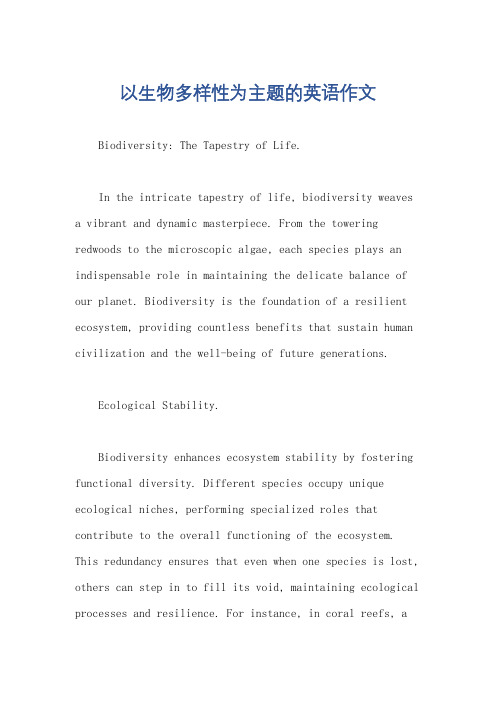
以生物多样性为主题的英语作文Biodiversity: The Tapestry of Life.In the intricate tapestry of life, biodiversity weaves a vibrant and dynamic masterpiece. From the towering redwoods to the microscopic algae, each species plays an indispensable role in maintaining the delicate balance of our planet. Biodiversity is the foundation of a resilient ecosystem, providing countless benefits that sustain human civilization and the well-being of future generations.Ecological Stability.Biodiversity enhances ecosystem stability by fostering functional diversity. Different species occupy unique ecological niches, performing specialized roles that contribute to the overall functioning of the ecosystem. This redundancy ensures that even when one species is lost, others can step in to fill its void, maintaining ecological processes and resilience. For instance, in coral reefs, adiverse array of species helps regulate nutrient cycling, control algae growth, and provide habitat for a multitude of organisms.Ecosystem Services.Biodiversity underpins a wide range of ecosystem services that are vital for human survival. Clean air, fresh water, productive soils, pollination, and natural pest control are just a few of the many services provided by diverse ecosystems. For example, forests absorb carbon dioxide from the atmosphere, purifying the air we breathe, while pollinators, such as bees and butterflies, ensure the production of numerous crops that feed the global population.Food Security.Biodiversity is the cornerstone of food security. Diverse agricultural systems rely on a wide range of crops and livestock to meet nutritional demands. Geneticdiversity within species provides a buffer against pestsand diseases, reducing crop failures and ensuring food availability. For instance, in the Amazon rainforest, thousands of plant species are used for food, medicine, and other purposes, contributing to the livelihoods of countless indigenous communities.Climate Regulation.Biodiversity plays a crucial role in regulating the Earth's climate. Forests and oceans act as carbon sinks, absorbing vast amounts of carbon dioxide and mitigating the effects of climate change. Diverse ecosystems also buffer against extreme weather events. For example, mangroves and salt marshes provide natural protection against coastal erosion and storm surges, while coral reefs act as barriers against ocean acidification.Medicinal and Pharmaceutical Advances.Biodiversity is a treasure trove of undiscovered medicinal compounds. Over half of the world's pharmaceuticals are derived from natural sources, and manymore promising treatments are waiting to be discovered. Plants, fungi, and marine organisms have yielded countless drugs that have revolutionized human health, including antibiotics, painkillers, and cancer treatments.Cultural and Aesthetic Value.Biodiversity enriches our lives beyond its practical benefits. Diverse ecosystems provide unparalleled beauty, inspiration, and recreational opportunities. National parks, protected areas, and wildlife sanctuaries offer a glimpse into the wonders of nature, fostering a sense of connection to our planet and a deep respect for all living things.Threats to Biodiversity.Despite its immense value, biodiversity is facing unprecedented threats. Habitat destruction, pollution, climate change, and overexploitation are pushing many species to the brink of extinction. The loss of a single species can have cascading effects on entire ecosystems, disrupting ecological processes and undermining theservices they provide.Protecting Biodiversity.Safeguarding biodiversity is an urgent global responsibility. Governments, organizations, and individuals must work together to implement conservation measures that address the root causes of biodiversity loss. These measures include:Habitat protection: Establishing protected areas, such as national parks and marine reserves, to safeguardcritical habitats and species.Sustainable practices: Promoting sustainable agriculture, forestry, and fishing practices that minimize environmental impact and preserve biodiversity.Pollution control: Reducing pollution from industrial activities, transportation, and agriculture to protect air, water, and soil quality.Climate change mitigation: Combating climate change by reducing greenhouse gas emissions and investing in renewable energy sources.Public awareness and education: Raising public awareness about the importance of biodiversity andfostering a culture of conservation.Conclusion.Biodiversity is the lifeblood of our planet, providing countless benefits that sustain human civilization and ensure the well-being of future generations. It is our collective responsibility to protect and cherish this irreplaceable treasure. By implementing conservation measures, promoting sustainable practices, and fostering a deep understanding of the interconnectedness of life, we can ensure that the tapestry of life continues to flourish for generations to come.。
以生物多样性为主题的英语作文

以生物多样性为主题的英语作文Biodiversity refers to the variety of life on Earth, including the different plants, animals, and microorganisms, as well as the ecosystems in which they live. It is an essential component of the environment and plays a crucial role in maintaining the balance of the ecosystem. Biodiversity provides us with a wide range of benefits, including food, medicine, and ecological services such as pollination, nutrient cycling, and water purification.However, biodiversity is currently facing a number of threats, primarily due to human activities. Deforestation, pollution, overfishing, and urbanization are just a few of the ways in which we are destroying the natural habitats of countless species. Climate change is also having a significant impact on biodiversity, causing shifts in the distribution and abundance of many species.It is essential that we take action to protect and conserve biodiversity. This can be achieved through the establishment of protected areas, the sustainable management of natural resources, and the implementation of conservation programs. Furthermore, raising awareness about the importance of biodiversity and the need for its protection is crucial in ensuring that future generations can continue to benefit from the rich tapestry of life on Earth.In conclusion, biodiversity is an irreplaceable and invaluable resource that sustains life on Earth. It is our responsibility to take action to protect and conserve it for the benefit of present and future generations. By working together, we can ensure that the incredible diversity of life on our planet continues to thrive.。
保护生物多样性的英语作文
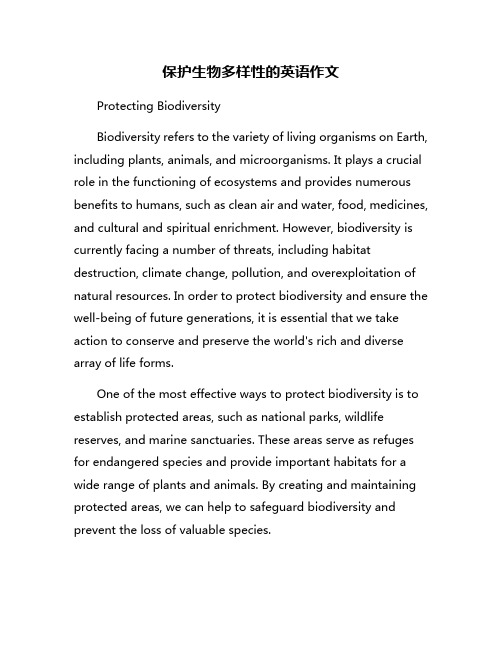
保护生物多样性的英语作文Protecting BiodiversityBiodiversity refers to the variety of living organisms on Earth, including plants, animals, and microorganisms. It plays a crucial role in the functioning of ecosystems and provides numerous benefits to humans, such as clean air and water, food, medicines, and cultural and spiritual enrichment. However, biodiversity is currently facing a number of threats, including habitat destruction, climate change, pollution, and overexploitation of natural resources. In order to protect biodiversity and ensure the well-being of future generations, it is essential that we take action to conserve and preserve the world's rich and diverse array of life forms.One of the most effective ways to protect biodiversity is to establish protected areas, such as national parks, wildlife reserves, and marine sanctuaries. These areas serve as refuges for endangered species and provide important habitats for a wide range of plants and animals. By creating and maintaining protected areas, we can help to safeguard biodiversity and prevent the loss of valuable species.Another important strategy for conserving biodiversity is to promote sustainable land-use practices, such as agroforestry, organic farming, and sustainable forestry. These practices help to minimize the negative impacts of agriculture, logging, and other human activities on biodiversity, while still meeting the needs of local communities for food, fuel, and other resources. By working with local communities to implement sustainable land-use practices, we can protect biodiversity and ensure the long-term health of ecosystems.In addition to establishing protected areas and promoting sustainable land-use practices, it is also important to address the underlying drivers of biodiversity loss, such as overconsumption, population growth, and climate change. By reducing our ecological footprint, conserving resources, and adopting environmentally friendly technologies, we can help to alleviate the pressure on biodiversity and create a more sustainable future for all living organisms.Ultimately, protecting biodiversity is not just a matter of conservation, but also a matter of social justice and environmental stewardship. By valuing and respecting the diversity of life on Earth, we can ensure that future generations have the opportunity to experience the wonders of nature andbenefit from the many services that biodiversity provides. Together, we can work towards a more sustainable and resilient world, where biodiversity thrives and all living organisms can coexist in harmony. Let us all do our part to protect and preserve the incredible diversity of life on our planet.。
高中生英语作文保护动物多样性
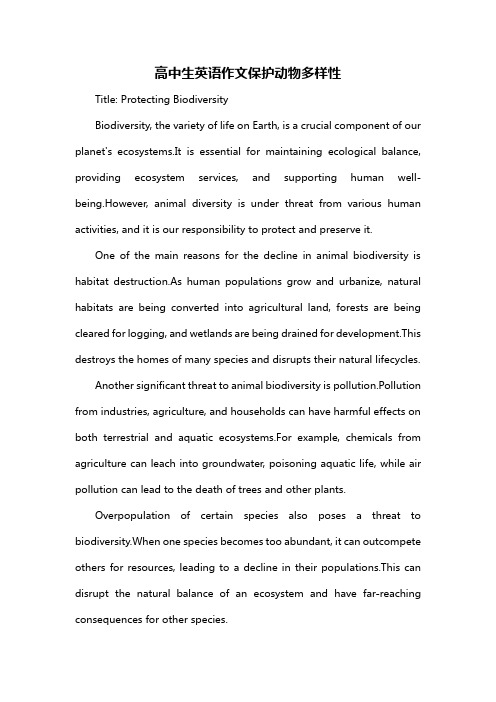
高中生英语作文保护动物多样性Title: Protecting BiodiversityBiodiversity, the variety of life on Earth, is a crucial component of our planet's ecosystems.It is essential for maintaining ecological balance, providing ecosystem services, and supporting human well-being.However, animal diversity is under threat from various human activities, and it is our responsibility to protect and preserve it.One of the main reasons for the decline in animal biodiversity is habitat destruction.As human populations grow and urbanize, natural habitats are being converted into agricultural land, forests are being cleared for logging, and wetlands are being drained for development.This destroys the homes of many species and disrupts their natural lifecycles.Another significant threat to animal biodiversity is pollution.Pollution from industries, agriculture, and households can have harmful effects on both terrestrial and aquatic ecosystems.For example, chemicals from agriculture can leach into groundwater, poisoning aquatic life, while air pollution can lead to the death of trees and other plants.Overpopulation of certain species also poses a threat to biodiversity.When one species becomes too abundant, it can outcompete others for resources, leading to a decline in their populations.This can disrupt the natural balance of an ecosystem and have far-reaching consequences for other species.To protect animal biodiversity, we must take action to address these threats.We can promote sustainable land use practices, such as agroforestry and organic farming, which help to preserve natural habitats and reduce pollution.We can also support conservation efforts, such as the establishment of protected areas and the reintroduction of endangered species into their natural habitats.Additionally, we must educate and raise awareness about the importance of biodiversity and the threats it faces.By fostering a sense of responsibility and respect for the natural world, we can encourage more people to take action to protect and preserve animal diversity.In conclusion, protecting animal biodiversity is a crucial task that requires our immediate attention and action.By addressing the threats to biodiversity, promoting sustainable practices, and raising awareness, we can help to ensure that future generations will be able to enjoy the richness and beauty of our natural world.。
- 1、下载文档前请自行甄别文档内容的完整性,平台不提供额外的编辑、内容补充、找答案等附加服务。
- 2、"仅部分预览"的文档,不可在线预览部分如存在完整性等问题,可反馈申请退款(可完整预览的文档不适用该条件!)。
- 3、如文档侵犯您的权益,请联系客服反馈,我们会尽快为您处理(人工客服工作时间:9:00-18:30)。
Rare species
Chinese alligator Yangtze alligator
扬子鳄
Dodo 渡渡鸟
Disaster
Sandstorm
Tsunami
Earthquake
Typhoon
How to protect biodiversity • Building natural reserve • Planting trees • Perfecting laws and regulations • building germplasm repository(种 质库)
English environmental slogan
• When buying stops, the killing can, too.没 有买卖,就没有杀害。 • Protecting environment is to protect ourselves. 保护环境就是保护人类自己。 • Destroying the environment is to destroying the homeland we lived by.破坏 环境就是破坏人类赖以生存的家园。 • Let birds fly.让鸟儿重返天空。
Food
Woods
The importance of biodiversity
Pollution
Mount Graham red squirrel
格莱汉姆山红松鼠
The Mexico spotted owl
墨西哥斑点猫头鹰
Hawaii goose
夏威夷鹅
Rare species
Alcedo Hercules
By Beyond
Useful phrases and sentences
• Improve the eco-environment改善生态环境 • Reinforce the conservation of water and soil加 强水土保持 • Keep ecological balance保持生态平衡 • Develop solar energy发展太阳能 • International Biodiversity Day 5月22日
Forest ecosystem
coniferous forest 针叶林
Maple 枫树
Marine ecosystem
dolphins
Clown fish (小丑鱼)
Jellyfish (水母)
Species diversity
Platalea minor 黑脸琵鹭
Lanius cristatus红尾伯劳 红尾伯劳
Biodiversity
Three aspects of biodiversity
Gene diversity
Ecosystem diversity
Species diversity
Gene diversity
Decisive factor Quiddity
Ecosystem diversity
Dragonfly
Snub-nosed monkey golden monkey 金丝猴
Doves 鸽子
Cattle egret 牛背鹭
Kangaroo
Egretta eulophotes 黄嘴白鹭
Lion
Flamingo 火烈鸟
Industrial raw material
Clothes
